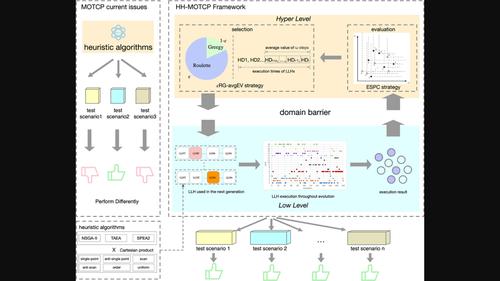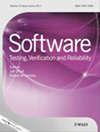MOTCP超层次超启发式框架研究
IF 1.2
4区 计算机科学
Q3 COMPUTER SCIENCE, SOFTWARE ENGINEERING
引用次数: 0
摘要
启发式算法被广泛用于解决多目标测试用例优先级(MOTCP)问题。然而,对于不同的测试场景,它们的表现是不同的,这使得在行业中为新的测试请求应用合适的算法变得困难。提出了一个具体的MOTCP超启发式框架(HH - MOTCP)来解决这个问题。它主要分为两部分:底层封装各种算法,高层包含动态选择底层算法的评估和选择机制。这个框架表现良好,但仍难以保持在前三名之列。如果评估机制能够更准确地分析当前结果,将有助于选择策略找到更有利于进化的算法。同时,如果选择策略能够找到更适合下一代的算法,那么HH‐MOTCP框架的性能将会更好。在本文中,我们首先提出了评估当前生成结果的新策略,然后对决定下一代启发式算法的选择策略进行了广泛的研究。实验结果表明,本文提出的新的评价和选择策略使HH - MOTCP框架更加有效和高效,几乎是除一个测试对象外的最佳两个测试对象,在所有测试对象中领先约40%。本文章由计算机程序翻译,如有差异,请以英文原文为准。

Research on hyper‐level of hyper‐heuristic framework for MOTCP
Heuristic algorithms are widely used to solve multi‐objective test case prioritization (MOTCP) problems. However, they perform differently for different test scenarios, which conducts difficulty in applying a suitable algorithm for new test requests in the industry. A concrete hyper‐heuristic framework for MOTCP (HH‐MOTCP) is proposed for addressing this problem. It mainly has two parts: low‐level encapsulating various algorithms and hyper‐level including an evaluation and selection mechanism that dynamically selects low‐level algorithms. This framework performs good but still difficult to keep in the best three. If the evaluation mechanism can more accurately analyse the current results, it will help the selection strategy to find more conducive algorithms for evolution. Meanwhile, if the selection strategy can find a more suitable algorithm for the next generation, the performance of the HH‐MOTCP framework will be better. In this paper, we first propose new strategies for evaluating the current generation results, then perform an extensive study on the selection strategies which decide the heuristic algorithm for the next generation. Experimental results show that the new evaluation and selection strategies proposed in this paper can make the HH‐MOTCP framework more effective and efficient, which makes it almost the best two except for one test object and ahead in about 40% of all test objects.
求助全文
通过发布文献求助,成功后即可免费获取论文全文。
去求助
来源期刊

Software Testing Verification & Reliability
工程技术-计算机:软件工程
CiteScore
3.70
自引率
0.00%
发文量
34
审稿时长
>12 weeks
期刊介绍:
The journal is the premier outlet for research results on the subjects of testing, verification and reliability. Readers will find useful research on issues pertaining to building better software and evaluating it.
The journal is unique in its emphasis on theoretical foundations and applications to real-world software development. The balance of theory, empirical work, and practical applications provide readers with better techniques for testing, verifying and improving the reliability of software.
The journal targets researchers, practitioners, educators and students that have a vested interest in results generated by high-quality testing, verification and reliability modeling and evaluation of software. Topics of special interest include, but are not limited to:
-New criteria for software testing and verification
-Application of existing software testing and verification techniques to new types of software, including web applications, web services, embedded software, aspect-oriented software, and software architectures
-Model based testing
-Formal verification techniques such as model-checking
-Comparison of testing and verification techniques
-Measurement of and metrics for testing, verification and reliability
-Industrial experience with cutting edge techniques
-Descriptions and evaluations of commercial and open-source software testing tools
-Reliability modeling, measurement and application
-Testing and verification of software security
-Automated test data generation
-Process issues and methods
-Non-functional testing
 求助内容:
求助内容: 应助结果提醒方式:
应助结果提醒方式:


